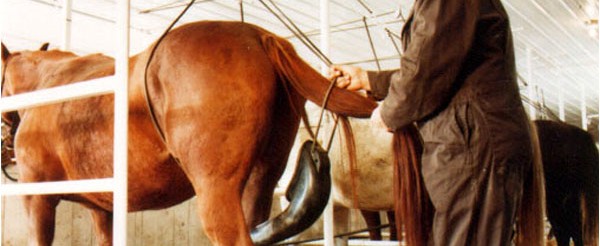Potential compromises to basic health and functioning of PMU mares:
- Disease and infection from the urine collection device
- Lack of exercise
- Undue stress.
- mares are stand tied may increase risk of injury from being tangled by ropes or harnesses
- In late pregnancy given confinement and subsequent lack of exercise are may be more edematous in the legs and (Houpt & Waran, 2003).
- Stand-tied mares can walk forward or backward several steps, lie down but cannot tum around. (Houpt et. at. 2001). This compromises the basic functioning of the mare.
- Animal activists and humane organisations declared repeatedly that mare were experiencing inhumane treatment in reports of water shortages to increase estrogen concentration, crowded housing and (Houpt et. at. 2001).

Industry Reports
- The Recommended Code of Practice for the Care and Handling of Horses in PMU Operations has clear recommendations for stall size based on weight of the mares.
- A rancher must provide an individual stall for each pregnant mare and each stall should be “sufficient size” to comfortable accommodate the horse at all times.
- Width of stalls must be 122-152cm (ranges for 590kg-799kg horse) from centre to centre (Manitoba Agriculture, Food, and Rural Initiatives, 2007)
- The 1997 equine veterinarians’ consensus report on the care of horses on PMU ranches stated the PMU production was humane.
- Horses are watered utilizing automatic water systems which ensure mares received fresh water multiple times a day (NAERIC, 2015).
